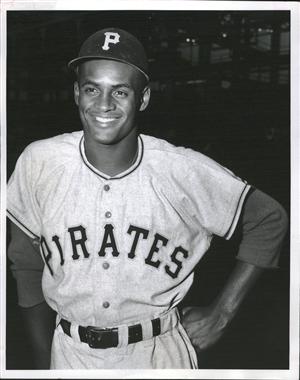-

Roberto Clemente
Roberto Clemente School 8 is proud of to be named after one of baseball’s greatest legends, Roberto Clemente. Most athletes fade into oblivion after their playing days, but Clemente's story has grown in the decades since his death. We honor Roberto Clemente through our daily work to help others and achieve excellence in learning.
Born near the sugar cane fields of Carolina, Puerto Rico, on Aug. 18, 1934, Roberto Clemente Walker played right field for the Pittsburgh Pirates for 18 seasons before dying in a plane crash on New Year's Eve, 1972, while trying to deliver medical aid and food to Nicaragua after a devastating earthquake. He was a stirring athlete whose charismatic style lifted his team and transcended the statistics that define the game of baseball.
His totals were exceptional enough-exactly 3,000 hits, the magic number to assure enshrinement in the Hall of Fame, along with a .317 career batting average and 12 Gold Gloves as the league's finest right fielder are among his accomplishments.
Clemente alone has emerged as the seminal figure in the baseball history of Latinos, and his memory still burns bright in all of Latin America. This is partly because of how he died -- on a humanitarian mission to help strangers, the plane plunging into the sea, his body never found. And partly it is because of how he lived and played -- with the same relentless force, and pride in who he was and where he came from.
From the start of his career, Clemente faced a double barrel of discrimination as a Spanish-speaking black man, and constantly raged against the inequities he faced. During Florida spring training for his first seven years with the Pirates, he was forced to live with a black family in the Dunbar Heights section of Fort Myers while his white teammates enjoyed hotel rooms downtown. When the team held its annual spring golf outing at the local country club, Clemente and his few black teammates were not invited. He found it humiliating to have to stay on the team bus while his white teammates stopped at roadside restaurants on Grapefruit League road trips, and finally forced the Pirates' management to let the black players travel in their own station wagon. Enduring spring training, he once said, was like being in prison.
Late in his career, Clemente’s reputation was solidified as the most revered of Latino ballplayers. The moment came in the locker room after the seventh game of the 1971 World Series. The Pirates had defeated the favored Baltimore Orioles with Clemente playing brilliantly at the plate, on the base paths and in the field.
Like Roberto Clemente, our school strives for excellence. We are committed to each other, our students, our parents, and the community. It is through this commitment that we honor Roberto Clemente, who strove to use his talents and skills to make the world a better place. We can do no less.
Select a School...
Select a School
- PreKindergarten & Early Childhood
- George Mather Forbes School No. 4
- John Williams School No. 5
- OACES Office of Adult & Career Education Services
- Virgil I. Grissom School No. 7
- Roberto Clemente School No. 8
- Dr. Martin Luther King Jr. School No. 9
- Anna Murray Douglass Academy School No. 12
- RECEC NE
- The Children's School of Rochester No. 15
- Dr. David & Ruth Anderson Academy No. 16
- Enrico Fermi School No. 17
- Dr. Charles T. Lunsford School No. 19
- Abraham Lincoln School No. 22
- Francis Parker School No. 23
- Nathaniel Hawthorne School No. 25
- Henry Hudson School No. 28
- Dr. Iris J. Banister School No. 33
- Ida B. Wells-Barnett Elementary School
- Pinnacle School No. 35
- Abelard Reynolds School No. 42
- Mary McLeod Bethune School No. 45
- Austin Steward Elementary School No. 46
- Helen Barrett Montgomery School No. 50
- Frank Fowler Dow School No. 52
- Montessori Academy School No. 53
- The Flower City School No. 54
- World of Inquiry School No. 58
- All City High
- Early College International High School
- East Upper & Lower Schools
- Edison Career and Technology High School
- Padilla High School at the Franklin Campus
- James Monroe High School
- Joseph C. Wilson Magnet High School
- Northwest Middle School at Douglass Campus
- Rochester International Academy
- School of the Arts
- School Without Walls Commencement Academy
- Home / Hospital Instruction
- Youth and Justice Programs
- Department of Bilingual Education & World Languages
- Special Education
- IM&T
- School Library System
- Student Support Services
- Virtual Academy of Rochester
- Summer Learning
- Dr. Freddie Thomas Middle School
- Andrew Langston Middle School
- Loretta Johnson Middle School
- Thurgood Marshall Middle School
- Florence S. Brown PreK Center at School No. 33

